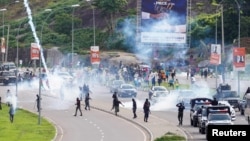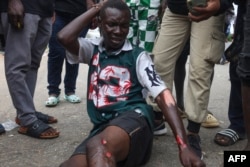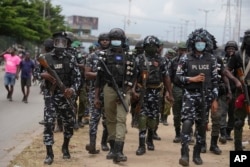Human rights group Amnesty International on Thursday said its investigation into Nigerian authorities' crackdown on anti-government protests in August showed state officials killed at least 24 protesters and detained more than 1,200 others. Amnesty's findings come amid growing concerns of a shrinking civic space in Nigeria.
A 34-page document report released by Amnesty International Thursday was based on eyewitness testimony and interviews with medical workers and families and friends of the victims.
Amnesty said Nigerian police used excessive force on demonstrators who had gathered to protest the soaring cost of living.
It said police killed at least 24 people, including two children. The casualties were recorded across Borno, Kaduna, Kano, Katsina, Jigawa and Niger states.
According to the report, police fired live rounds at close range targeting the victims' heads and torsos, while some other victims were suffocated by the indiscriminate use of tear gas.
Isa Sanusi, Amnesty's Nigerian country director, believes the actual death toll could be much higher.
"Even today as we're launching this report in Kano, many families were coming out to tell us that their children are missing and many are believed to have been killed or be in secret detention. Therefore, the whole issue is far broader than what we have talked about in that report. This just goes to show that Nigerian authorities are not ready to accept the fact that the people have the right to peaceful protest," he said.
The August protests, which organizers called “Ten Days of Rage,” were in response to the soaring cost of living many believed was caused in part by President Bola Tinubu’s reforms, including the removal of fuel subsidies.
Nigerian police authorities have not responded to Amnesty's allegations, but have previously denied using live bullets to quell the demonstrations.
A national police spokesman did not take VOA's calls for comment.
Nigeria has a long history of police brutality despite repeated promises to be more accountable.
During the protests in August, heads of security agencies held an emergency meeting and the chief of Defense Staff, General Christopher Musa, addressed journalists.
"None of us here is happy to hear any Nigerian is injured for whatever reason. It's our duty the protect Nigerians. We're going to remain focused, committed, we're going to respect human rights, the rights of everyone who's lawfully performing his task or duty. But we will not relent in pursuing those that have continued to encourage unconstitutional takeover of government or subversion or those ones that are into vandalism or destruction of lives and property," he said.
Amnesty's report comes amid growing concern by human rights groups that Nigerian authorities are trying to stifle political dissent.
Sanusi said authorities are not serious about stopping the use of excessive force.
"The lack of accountability, the denial of the killings by the police and other government officials are just signs of the fact that impunity is still reigning in Nigeria and that has to stop. It happened during End SARS protests. We have consulted them to ask for their comment and they didn't say anything. What we want them to do is to hold those responsible of those killings to account," he said.
In October 2020, police brutality sparked massive protests against the Special Anti- Robbery Squad or SARS unit of the police.
The protests ended in a deadly shooting at the Lekki toll gate in Lagos.






